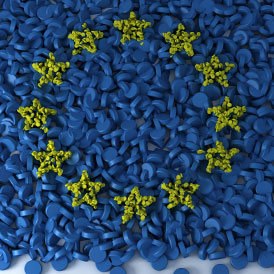Euro bailout fund only temporary fix – King
Bank of England Governor Sir Mervyn King tells MPs measures adopted at the eurozone summit will only provide “a year or possibly two years’ breathing space” and the underlying problems remain.

With eurozone leaders meeting in Brussels on Wednesday to discuss the debt crisis, Sir Mervyn told the Treasury select committee: “The aim of the measures to be introduced over the next few days is to create a year or possibly two years’ breathing space. The underlying problems still have to be resolved.”
Eurozone countries are aleady close to agreement on boosting the size of Europe’s bailout fund and banks’ balance sheets.
French President Nicolas Sarkozy, who was involved in in an argument with David Cameron at the weekend, has climbed down in his dispute with German Chancellor Angela Merkel over the fund.
He had pushed for the European Financial Stability Facility (EFSF) to become a bank funded by the European Central Bank, but Chancellor Merkel was opposed.
Under threat
With the EU anxious to avoid a Greek debt default, the ripples from the financial crisis have spread throughout Europe, with France in danger of losing its AAA credit rating.
Having Berlin as the new Brussels would be dangerous. Nicholas Dungan, Atlantic Council
Last week, President Sarkozy told officials from his party that Europe’s fate would be determined in the next few days.
“Nobody benefits from a weakened France. It certainly doesn’t help the Germans (and) having Berlin as the new Brussels would be dangerous,” said Nicholas Dungan, a senior fellow at the Atlantic Council in Washington. “If France starts looking like a second-division player, then its leverage over Germany diminishes.”
Commons debate
The nervousness in the eurozone overshadowed the debate in the Commons on Tuesday, which ended with 81 Conservative MPs defying a three-line whip to vote for a motion calling for a referendum on Europe. The prime minister told MPs that with the eurozone in turmoil, the timing of the debate was wrong.
Chancellor Merkel is also under pressure in the German parliament, which will vote on Wednesday on plans to strengthen the 440bn euro EFSF. After the vote, which the German government is expected to win, Chancellor Merkel will travel to Brussels for the summit.
On Monday, Mr Cameron told the Commons he had stood up for Britain at the weekend talks in Brussels. He had argued that the views of Britain and other EU countries that were not members of the euro should be heard on Wednesday, which led to a row with President Sarkozy.
Mr Cameron said: “I don’t for one minute resile from the need sometimes to speak clearly and frankly on behalf of Britain and stand up for the British national interest. It is in our national interest that the eurozone deals with its problems, and it is right that we make that clear.”
Bailout fund
The EFSF, which has been used to bail out Portugal and Ireland, is based on guarantees from all eurozone countries and raises money by issuing bonds.
Financial markets are not convinced it is big enough to handle debt problems in Italy and Spain, and eurozone leaders are now trying to come up with ways to strengthen the fund without increasing the guarantees governments have made.
-
Latest news
-
Scarlett Johansson ‘shocked’ and ‘angered’ claiming ChatGPT ‘imitated’ her voice3m

-
One-punch deaths: parents help son’s killer turn life around5m

-
Dirty rivers: Ruben Reuter challenges water minister8m

-
UK economy: when will the interest rate fall?3m

-
Ex-Post Office company secretary questioned over Horizon scandal5m

-




